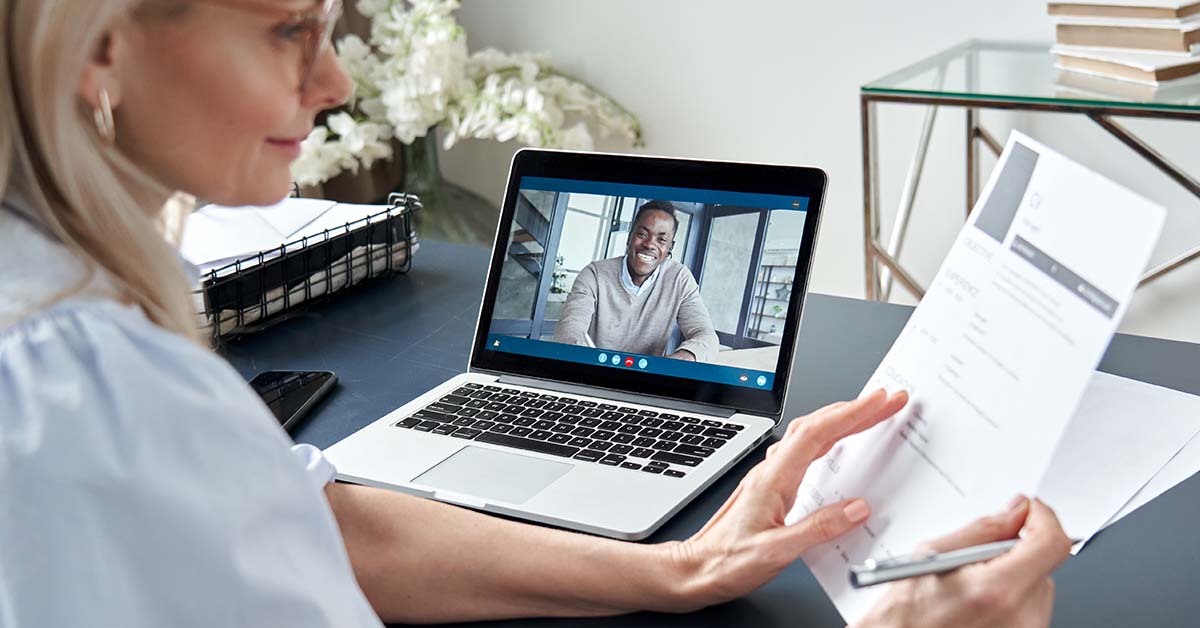09 Aug 2023
10 most-asked interview questions and answers
So, you’ve taken the plunge and begun your job search, but now you’re faced with the thrilling and nerve-wracking next step: the job interview.
Firstly, congratulations! You’ve made it through the first stage. Your skills and experience have caught the eye of the employer, and now it’s time to prove that you’re someone who’ll fit right into the work culture, who’ll be a great performer and an enthusiastic learner.
The way to prove that is, unfortunately, by answering a series of questions about yourself and your career with a total stranger. But job interview questions don’t need to be so intimidating. All it takes is some preparation to go in there with confidence and ease.
It’s important to get a grip on some of the most common questions asked by interviewers, so you have time to reflect on yourself and how you might respond.
So, let’s get started! Here we’ll walk you through some of the most common job interview questions, some examples of how you might like to answer, as well as other handy job interview tips that’ll set you on your way to landing your dream job.

Common interview questions with example answers
If there’s one thing to understand, it’s that every job interviewer is different, and every job is different. So, the questions you’ll get will vary quite a lot. But they’ll always centre around the same general themes, which is why it’s still a good idea to use these to help you reflect and prepare for any interview!
First, we’ll break down the real reasons why the interviewer is asking the question, what you need to think about, and an example, so you’re truly prepared to knock your job interview out of the park!
1. Tell me about yourself
Where to even begin with this one? If you’re ill-prepared, it’s understandable that you might start listing off a bunch of random information or find yourself getting stuck!
When an interviewer asks you about yourself, they’re not looking to learn about your whole life. They want to hear a quick rundown about your journey through educational and professional life.
What you need to think about:
Give an overall impression of where you’ve been, what you’re doing now, and why you hope for a future at their business. You should also share the highlights of your career, any achievements, and particular skills you’ve picked up along the way.
Throwing in a tiny bit of information about your hobbies or interests isn’t a bad idea too! It will help show off your unique personality and make you memorable. Just make sure it’s work appropriate, of course!
Examples:
‘After I finished school, I gained an interest in healthcare, and I decided I wanted to work with people and make a difference in their lives. So, I started as an entry-level chairside assistant at a reputable dental clinic, which allowed me to work while I completed my Certificate III in Dental Assisting from Foundation Education.
Throughout my time there, I honed my skills as a Dental Assistant, taking patient X-rays, preparing dental instruments, and maintaining a clean and sterile environment.
I discovered I really love being a Dental Assistant. I've been told I’m really great at creating a comfortable and supportive atmosphere that helps patients feel at ease during their dental procedures.
My proudest achievement is developing and implementing informative brochures that helped explain dental hygiene techniques to children, and we actually saw a noticeable improvement in their oral health.
Outside of work, I also really enjoy keeping active, usually by playing community sports like touch football, or going swimming when it’s warm!’

2. Why are you interested in working at this organisation?
This is one to look out for! It’s how employers get a feel for how much you know about the business you want to work at. They want to know you’ve put in a little bit of effort and that you’ve thought about whether you’d actually like to work there. It also helps the interviewer understand a little more about you and your values, and how they fit in with the workplace.
What you need to think about:
Think about your values, and definitely do research on the business, their story and their values. You want to create a connection between you and the workplace, so they feel you’d fit in really well there.
Example:
‘I’ve always been passionate about fostering a positive and nurturing environment for young minds, and that's exactly the reputation your centre has in the community.
I've heard amazing things from parents and staff members about the creative and innovative teaching methods used here. Your centre's focus on holistic child development matches my own beliefs about Early Childhood Education. The ongoing training and professional development programs also stood out to me, as I think it’s important to always be learning and growing as an Educator. ‘
3. Why do you think you are a good fit for this role?
This is to test out whether you understand the requirements of the specific role and find out what parts about it are most interesting to you so they can see if you’d fit their needs well.
What to think about:
Read the role and try to explain it to a friend or partner (or imaginary friend) in your own words. Look at all the responsibilities and pick out the ones you’re most excited about. Back up those responsibilities with examples of how you’ve done those things in the past.
Example:
‘I have a strong passion for supporting and empowering students with special educational needs. My years of experience in the classroom mean I’m confident in providing instruction and support, implementing programs and working individually with diverse student needs.
I also am very comfortable using technology. I set up software specifically to help children with learning difficulties in my last school, with great outcomes, so I think I’d fit the specific needs of the role perfectly.’
4. Give me an example of when you went above and beyond for a client/customer
When an interviewer asks you this, they want to see how enthusiastic you are about your work, and what level of dedication they can expect from you if they were to hire you.
What to think about:
Try to think back to any times you’ve gone beyond the basic expectations of your job to make things easier for your clients/customers or coworkers.
Example:
‘There was a time I was working with a client who struggled with mobility. Outside of our regular sessions, I developed a home exercise routine suited to their needs and offered phone calls to go through any concerns. Seeing their progress and improved quality of life was super rewarding.’
5. Give me an example of when you made a mistake and how you handled it
We’re all human, so mistakes are common in any job. The point is how you handle them. The interviewer wants to know you’ve got the character to own up to your errors, reflect on them, and fix them efficiently.
What to think about:
Think about a minor mistake – if you have any huge blunders in your past, maybe it’s best to leave those out. Think about how you moved forward, and what you would’ve liked to do differently.
Example:
‘During a busy rush in the Christmas shopping period, I accidentally overcharged a customer. I apologised straight away, corrected the mistake, and with my managers’ approval I offered a discount for their inconvenience. The customer appreciated my honesty and was very understanding. After that I learned to be more mindful about attention to detail in fast-paced situations.
6. What motivates you?
An interviewer wants to hire someone who knows what drives them, and whether it lines up with the role. If you’re applying to be an Allied Health Assistant, for example, and you’re driven by performance outcomes – you’re probably better suited to retail or project management!
What to think about:
Consider times in your life when you’ve felt really motivated to accomplish something. What was the driving factor?
Example:
As a Project Manager, I’m really motivated by challenges with a lot of different elements. I love leading a team, encouraging innovation, and when I finally see those successful outcomes, it is extremely rewarding to me.

7. What are your greatest strengths?
This is your time to shine! The employer wants to know your skills, whether they’re things you’re naturally good at or you’ve learned them through study and experience.
What to think about:
What has always stood out as something you’re good at, especially compared to others? And what things have you learned throughout your educational and professional career?
Example:
I have always had a knack for organisation, logical decision-making, and I’ve always been able to communicate things very clearly and efficiently. I’ve also learned a lot about managing various complex payroll processes, so I feel this is a strong point for me. It’s actually these qualities that attracted me to working in business administration, as I feel like my talents are better appreciated in this role than anywhere else.
8. What are your greatest weaknesses?
Here, the interviewer is giving you an opportunity to show some self-awareness and your commitment to professional self-improvement.
What to think about:
Reflect on some skills that aren’t your natural strong-suit, and how you might like to get better at those things. Give real-life professional examples!
Example:
‘I can be a little too meticulous sometimes, which means service can be slightly slower when we’re experiencing a rush in the cafe. However, I've been actively working on improving my time management skills and being a bit less perfectionistic so I can give customers the best of both worlds – amazing food, and short wait times.’
9. Where do you see yourself in five years?
Your employer wants to know if your vision for the future matches up with a future at their business. They probably don’t want to hire someone who’s going to leave in six months, after all.
What to think about:
What do you hope you’ll be better at in a few years' time? What job would you like to be working? Do you have any goals you’d like to achieve? Write them down!
Example:
In five years, I’d like to have a wealth of expertise in human resources. Ideally, I’ll be playing a key role in encouraging professional development culture and well-being for employees and pushing for HR projects that align with the company's values.
10. Do you have any questions?
Whatever you do, don’t say ‘no!’ Your interviewer wants to know that you’re curious, and therefore enthusiastic about working with them. And besides, the whole interview has been about seeing if you’re the right fit for the business, but now it’s your turn to see if the business is the right fit for you.
What to think about:
Reflect on what you’re looking for in your next job. What aspects and challenges are important for you to have? Maybe it’s a great work culture, or perhaps it’s professional development opportunities? And what more would you like to know about the role? Answer these questions for yourself, but then redirect them to being about how you can help contribute to the business.
Examples:
Can you tell me about the team dynamic and how the Practice Manager role fits into that?
I love to streamline processes. How would you like to see the Practice Manager contribute towards efficiency?
Are there any exciting projects or tasks the team has tackled lately, and was the Practice Manager involved?"

Preparing for your interview
So, you've gone through and answered these common questions for yourself? Amazing work! Now it’s time to review your answers and figure out the best way to deliver them. Whether that’s tweaking the wording, or working on your tone and body language, here are a few extra tips to take you to that next level.
Be careful of appearing too right
Keep things realistic and authentic. If you’re interviewing for a toothpaste company, don’t say your favourite website is dentalhygiene.com. No one will believe you and your attempt to fit like a glove will send your credibility down the drain.
“What are your strengths?” Answer honestly and relevantly.
“Where do you see yourself in 5 years?”
“At your larger competitor” might be the real answer. But: “As far advanced professionally as I can be in the industry, preferably in a managing role with more responsibility” might be a better option for getting on the shortlist.
Work on your phone, group, and final interview skills
Some of us can ace an interview in front of ten senior executives yet fall to pieces on a phone call. What’s your biggest strength – face-to-face or down the line? If you struggle with one, practice is key.
Get friends or family to act as tough interviewers. Arm them with the questions, hone your answers and polish them until it’s thoroughly rehearsed, yet delivered naturally. Because when you prepare well, you’ll find it much easier to stay calm and feel like yourself throughout your interview.
Review the job description
This is a great proactive approach that’ll show off just how prepared you are.
Reviewing the job description before an interview will help you get a better feel for what the role is all about and what’s going to be expected of you.
It’ll also remind you of the things that made you interested in the job in the first place, so you can be sure of how and why you’re suitable for the role.
When you’re going through the description, be sure to jot down any notes and questions you have about the job. Doing this should help create a more engaging conversation during the interview, so that things flow a little more naturally.
Research will win the day
It goes without saying that you should know a little bit about the company or business you want to work at. Spend a bit of time checking out their website - go to the about page, read their story, and learn the name of the CEO or owner/manager. You should also find out who their competitors are, as this helps you understand what makes the business different to others offering similar services or products.
All in all, practice makes perfect! If you’ve read through these common job interview questions, followed our interview preparation tips and done your homework, we’re sure that you’ll ace your interview.
And if you’d like to add a little extra sparkle to your resume and stand out amongst your peers, why not consider expanding your expertise with a nationally recognised qualification? Check out our range of industry-relevant courses or give us a call on 1300 616 197 to find out more.
Get in touch with us today.

Proud member of

Funding
© Foundation Education | RTO Number 22557
